Related Research Articles

Sir Steve Rodney McQueen is a British film director, film producer, screenwriter, and video artist. For services to the visual arts, he was appointed Commander of the Order of the British Empire in 2011. In 2014 he was included in Time magazine's annual Time 100 list of the "most influential people in the world". He has received an Academy Award, two BAFTA Awards and in 2016 the BFI Fellowship.
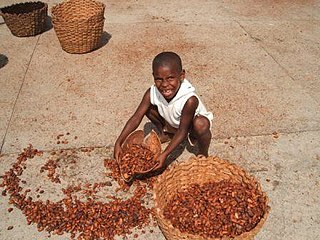
Child labour is a recurring issue in cocoa production. Ivory Coast and Ghana, together produce nearly 60% of the world's cocoa each year. During the 2018/19 cocoa-growing season, research commissioned by the U.S. Department of Labor was conducted by NORC at the University of Chicago in these two countries and found that 1.48 million children are engaged in hazardous work on cocoa farms including working with sharp tools and agricultural chemicals and carrying heavy loads. That number of children is significant, representing 43 percent of all children living in agricultural households in cocoa growing areas. During the same period cocoa production in Cote d’Ivoire and Ghana increased 62 percent while the prevalence of child labour in cocoa production among all agricultural households increased 14 percentage points. Attention on this subject has focused on West Africa, which collectively supplies 69% of the world's cocoa, and Côte d'Ivoire, supplying 35%, in particular. The 2016 Global Estimates of Child Labour indicate that one-fifth of all African children are involved in child labour. Nine percent of African children are in hazardous work. It is estimated that more than 1.8 million children in West Africa are involved in growing cocoa. A 2013–14 survey commissioned by the Department of Labor and conducted by Tulane University found that an estimated 1.4 million children aged 5 years old to 11 years old worked in agriculture in cocoa-growing areas, while approximately 800,000 of them were engaged in hazardous work, including working with sharp tools and agricultural chemicals and carrying heavy loads. According to the NORC study, methodological differences between the 2018/9 survey and earlier ones, together with errors in the administration of the 2013/4 survey have made it challenging to document changes in the number of children engaged in child labour over the past five years.
The Hot Docs Canadian International Documentary Festival is the largest documentary festival in North America. The event takes place annually in Toronto, Ontario, Canada. The 27th edition of the festival took place online throughout May and June 2020. In addition to the annual festival, Hot Docs owns and operates the Hot Docs Ted Rogers Cinema, administers multiple production funds, and runs year-round screening programs including Doc Soup and Hot Docs Showcase.

500 Years Later is a 2005 independent documentary film directed by Owen 'Alik Shahadah and written by M. K. Asante, Jr. It has won five international film festival awards in the category of Best Documentary, including the UNESCO "Breaking the Chains" award. It has won other awards including Best Documentary at the Pan African Film Festival in Los Angeles, Best Documentary at the Bridgetown Film Festival in Barbados, Best Film at the International Black Cinema Film Festival in Berlin, and Best International Documentary at the Harlem International Film Festival in New York.

Earthlings is a 2005 American documentary film about humanity's use of other animals as pets, food, clothing, entertainment, and for scientific research. The film is narrated by Joaquin Phoenix, features music by Moby, and was directed by Shaun Monson, executive produced by Libra Max and co-produced by Maggie Q. A sequel titled Unity was released in 2015.

Slavery has been called "deeply rooted" in the structure of the Northwestern African country of Mauritania and "closely tied" to the ethnic composition of the country, despite the cessation of slavery across other African countries and a ban on the practice by colonial owners in 1905.
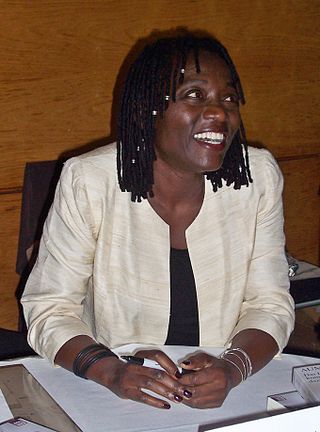
Rita Auma Obama, is a Kenyan-British community activist, sociologist, journalist, author, and half-sister of the 44th president of the United States, Barack Obama. Obama serves as the executive chairwoman of Sauti Kuu Foundation, a non-profit organisation that helps orphans and other young people struggling with poverty in Kenya.
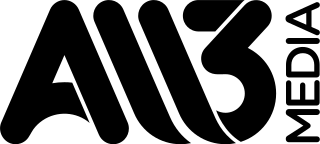
All3Media Limited is a British worldwide independent television, film, and digital production and distribution company based in London, England. The All3Media group comprises more than 50 production and distribution companies and labels from across the United Kingdom and all other parts of Europe, New Zealand and the United States.

Afro-Iranians are Iranian people of African Zanj heritage. Most Afro-Iranians are concentrated in the coastal provinces of Persian Gulf such as Hormozagan, Sistan and Baluchestan, Bushehr and Khuzestan.
Why Democracy? is a documentary film series produced by The Why Foundation, previously named Steps International. The series consists of 10 films depicting independent documentary filmmakers' personal perception of and experience with democracy. The series was broadcast by 42 different broadcasters worldwide between 8 and 18 October 2007. The series was accompanied by a global interactive conversation about "democracy," which took place in real and interactive space.
The Dark Side of Chocolate is a 2010 documentary film about the exploitation and slavetrading of African children to harvest chocolate still occurring nearly ten years after the cocoa industry pledged to end it.
DAU is a 2019 Russian film of the DAU project organised by Ilya Khrzhanovsky. The film deals with the life of the Nobel Prize-winning Soviet scientist Lev Landau. The premiere in Paris on 25 January 2019 was in the form of a dozen feature films screened inside an extensive around-the-clock immersive installation. The film is one of Russia's largest and most controversial cinematic projects.
This page lists the winners and nominees for the BAFTA Award for Best British Short Animation for each year since 1990 when the award was introduced. The British Academy of Film and Television Arts (BAFTA), is a British organisation that hosts annual awards shows for film, television, children's film and television, and interactive media.

Highrise is a multi-year, multimedia documentary project about life in residential highrises, directed by Katerina Cizek and produced by Gerry Flahive for the National Film Board of Canada (NFB). The project, which began in 2009, includes five web documentaries—The Thousandth Tower, Out My Window, One Millionth Tower, A Short History of the Highrise and Universe Within: Digital Lives in the Global Highrise—as well as more than 20 derivative projects such as public art exhibits and live performances.
Charlie Phillips is the head of documentary acquisition and production and The Guardian, and a former deputy director of Sheffield Doc/Fest in the United Kingdom.
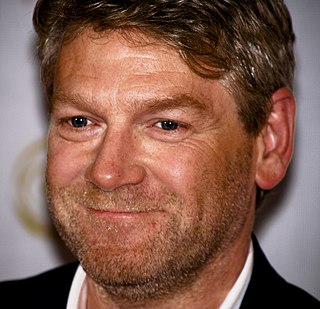
The following is the filmography for actor, director, producer and screenwriter Kenneth Branagh.
Jerry Rothwell is a British documentary filmmaker best known for the award-winning feature docs How to Change the World (2015), Town of Runners (2012), Donor Unknown (2010), Heavy Load (2008) and Deep Water (2006). All of his films have been produced by Al Morrow of Met Film.

The Anthropologist is a 2015 American documentary film directed by Seth Kramer, Daniel A. Miller, and Jeremy Newberger of Ironbound Films. The film follows environmental anthropologist Susie Crate and her teenage daughter Katie as they visit indigenous communities threatened by climate change. Featuring commentary from Mary Catherine Bateson, daughter of famed anthropologist Margaret Mead, the film explores how human beings adapt to catastrophic change.
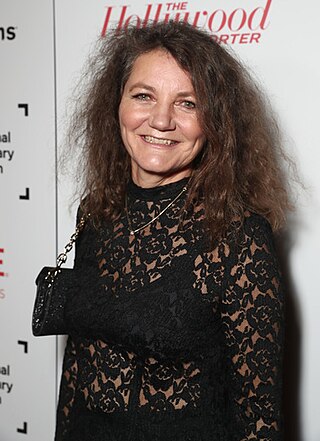
Mette Hoffman Meyer is a Danish documentary film producer. Based in Copenhagen, Denmark she is CEO of The Why Foundation, cofounder with an American-born British film director. Mette was previously head of documentaries and co-productions at Denmark’s public service broadcasting cooperation, DR, and commissioning editor of the factual series Dokumania on DR channel 2.
George Amponsah is a British director of documentary films. His 2015 feature-length documentary about the death of Mark Duggan, The Hard Stop, won him a 2017 BAFTA nomination for the Award for Outstanding Debut by a British Writer, Director or Producer.
References
- 1 2 Goldman, Lisa. "There are over 40 million people living in slavery around the world | The Passionate Eye". CBC.
- ↑ Rafique, Waiza (15 January 2020). "Discussing Human Rights through films: #The Why Film Festival 2020". Daily Times.
- ↑ "Documentales para acercarse a la otra cara del mundo". La Capital. October 17, 2018.
- 1 2 Paul, Jonathan (September 15, 2016). "DR TV doc chief Mette Hoffmann Meyer to step down". Realscreen.
- ↑ Ravn Nielsen, Marie (September 24, 2014). "DR2 mister markant journalistisk chef". DR.
- ↑ "About THE WHY". www.thewhy.dk.
- ↑ Jensen, Sally (October 8, 2018). "Seks nye dokumentarfilm skal åbne verdens øjne for moderne slaveri - Danwatch". danwatch.
- ↑ Ravindran, Manori (July 24, 2019). "Why in the World: Foundation Promotes Human Rights through Docs". The IDA.
- ↑ Freije, Layal (April 14, 2019). "Film som ændrer verden: "Vi siger, at vi er verdens mindste organisation med verdens største footprint"". Børsen.
- ↑ Ravindran, Manori (September 23, 2014). "Steps Int'l rebrands as Why Foundation, names CEO". Realscreen.
- ↑ "Why Poverty? Steps International, BBC, DR-Danish Broadcast Corp". Peabody.
- ↑ Flott, Søren (October 15, 2018). "Mennesker til salg: Køb en slave for 581 kroner". Fyens Stiftstidende.
- ↑ Nordentoft, Ane (September 27, 2018). "Serie af dokumentarfilm sætter fokus på moderne slaveri | Globalnyt". Globalnyt.
- ↑ Movin, Lars (November 1, 2007). ""Why Democracy?": Is Democracy for Everyone?". Det Danske Film Institutet.
- ↑ Fraser, Nick (November 15, 2012). "Global broadcasters in partnership ask 'WHY POVERTY?'". BBC.
- ↑ Arvin, Bo Bech (May 7, 2016). "DR sætter fokus på kvinders vilkår og ligestilling". DR.
- ↑ "Why Plastic?". www.thewhy.dk. Retrieved 2022-11-18.
- ↑ "WHY PLASTIC?". Aarhus Series. October 27, 2021. Retrieved 2022-11-18.